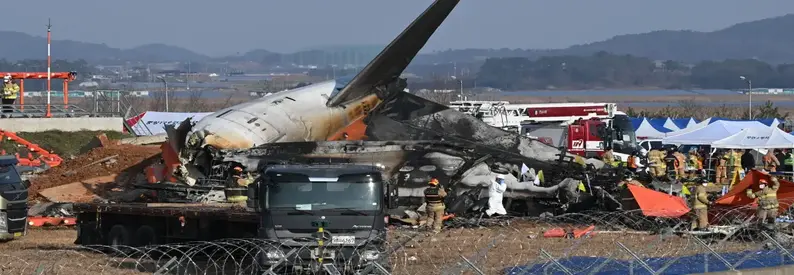Investigation Underway After Deadly Jeju Air 737-800 Crash

A tragic crash at Muan International Airport in South Korea has resulted in the deaths of 179 of the 181 passengers aboard Jeju Air Flight 7C2216. The Boeing 737-800, a widely used aircraft model, landed without its landing gear deployed, sparking an investigation into the exact cause of the fatal incident.
The aircraft, which was around 15 years old, had previously been operated by Ryanair before being acquired by Jeju Air in 2017. It crashed after an aborted landing, skidding off the runway and hitting a mound of dirt, ultimately bursting into flames. Only two crew members survived the crash.
South Korea’s acting President Choi Sang-mok has ordered an emergency inspection of all Boeing 737-800 aircraft operating in the country, following the deadly crash. The inspection aims to ensure the safety of the aircraft and prevent similar accidents in the future. The Boeing 737-800 is one of the most commonly used aircraft in the world, with approximately 4,400 units in service, making up about 17% of the global commercial passenger jet fleet.
The plane’s descent occurred after the pilot reportedly issued a mayday warning and aborted the landing attempt. Early reports suggest that a possible bird strike may have played a role in the crash by disabling one or both of the plane’s engines. Experts speculate that if the engines were affected, the crew may not have had time to perform emergency checklists due to the altitude at the time of the incident.
The aircraft was operating from Baku, Azerbaijan to Muan, and had attempted to land at the airport when it failed to deploy its landing gear, a malfunction that experts say could be caused by hydraulic failure. However, Boeing 737-800 pilots are typically trained to manually lower the landing gear in such cases, adding further complexity to the investigation.
The National Transportation Safety Board (NTSB), along with representatives from Boeing and the Federal Aviation Administration (FAA), is assisting South Korea’s aviation investigation team. The NTSB is leading the U.S. team, as the Boeing 737-800 was manufactured and certified in the U.S.
The crash has raised questions about the safety of the Boeing 737-800, which has a strong safety record and is not typically associated with design flaws. The model has been in service for nearly three decades and has been one of the most reliable in the aviation industry. However, investigators are carefully examining maintenance records, operations, and potential bird strike incidents to understand the cause of the crash.
In the wake of the accident, Jeju Air has pledged to support the victims’ families and confirmed that the aircraft was insured for $1 billion. The airline’s spokesperson denied claims that mechanical issues or inadequate maintenance were factors in the crash. Meanwhile, Boeing’s stock fell more than 2% following the incident as South Korea’s Ministry of Land, Infrastructure, and Transport conducted inspections of 737-800s operated by South Korean airlines.
This tragic crash has underscored the ongoing concerns regarding aviation safety and the importance of thorough investigations to ensure the well-being of passengers and crew worldwide.
Related News : https://suspicious-zhukovsky.67-21-117-18.plesk.page/?s=South+Korea+Airlines
Sources: AirGuide Business airguide.info, bing.com, cnbc.com
